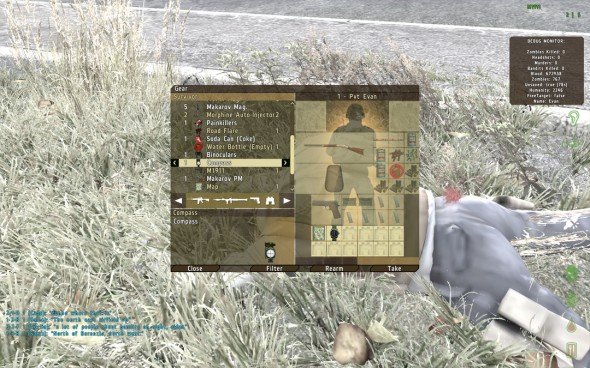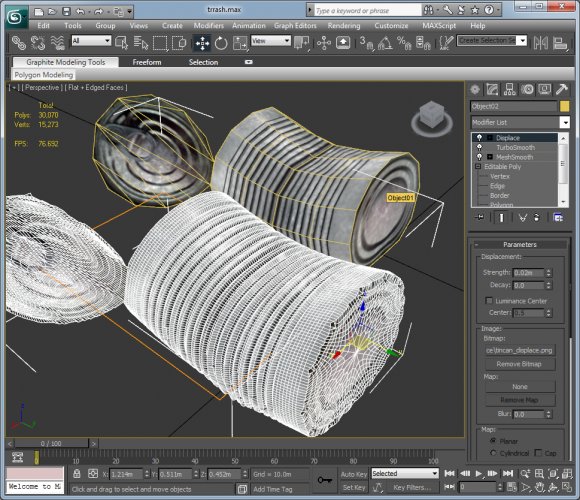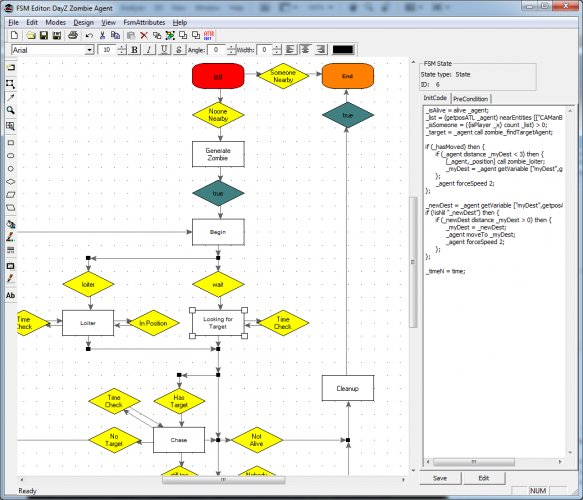Day Z interview -- how zombies + Arma 2 created gaming's best story machine

PCG: So what's your best story?
Hall: I had this amazing moment—I was helping a couple of new guys, they were in Cherno as all the new guys go, and I said “look you guys need to leave here, I'll take you to the southern airfield to get some good weaponry.” I was taking them along there and we saw this guy, it was night, he'd thrown some flares and I told the guys to get down, and we called out to him and we said “Are you friendly? Are you friendly?” He didn't reply, he just looked at us and then started running away, and as he was running up the hills out the back I thought “Oh, I'll just fire some warning shots.” And so, I fired a couple of warning shots, just to keep him away. And he started rolling, and I don't know why. Maybe it was curiosity, maybe it was just because I could. I'm not sure what compelled me, but I carried on shooting and the next minute I saw “such and such is killed.”
One of the new guys goes “Wow, you killed him,” and I just remember, it actually had a profound impact on me. I suddenly thought—that guy could've been playing for six hours or a day, you know. And I killed him, and for what? For almost this morbid curiosity. I was still thinking about it two days later and I think that's quite a powerful thing, when something compels you think “well, what was my motivation?” Because if I had killed someone in say, Battlefield 3 or something like that, I still wouldn't be thinking about it the next day.
That's permadeath, right? But I think it's also just the general brutality of Day Z and how simple things are made significant. I was on last night with my friend and we were walking along the train tracks along the southern coast. and he's like “Stop!” I thought he heard gunfire. And he's like, “Do you hear that?” “Hear what?” “Dude, there's a helicopter.” I go prone, and I can hear it faintly in the distance. I woke up today, and I'm still thinking of that: somebody built a helicopter ; where was it? Who did that? How close was it, how can I get to it? I'm emotionally caught up in a sound file, essentially, because there's this mysterious history behind it.
Hall: Exactly. And that's actually amazing, what people have been able to achieve as groups. That's where these amazing stories come out. I read through the forums and I was just beside myself, I couldn't believe the situations that happened. People posting and comments on the articles, just these unbelievable coincidences and camaraderie and also these terrible tragedies.
I think it just conveys that players are really smart and they'll surprise you if you give them agency.
Hall: Yeah, exactly. And things evolve and they change, and that's been a really interesting aspect of the system. And because it's all centralized in a database, we're able to look at that and see where people are dying and what they're doing. And its really giving a fascinating insight into really what is a big sort of anti-game experiment. To see how people cope with these changes. Like for example: we just fixed some bugs, and now we have thousands of zombies spawning in where we used to have hundreds. So, watching how players react to that situation, how it affects our player interactions and whether or not they're teaming up.
The biggest gaming news, reviews and hardware deals
Keep up to date with the most important stories and the best deals, as picked by the PC Gamer team.
Is Arma's engine is the only one that could support a game like this?
Hall: Well, I think that this specific type of game, yes. The engine itself is brutal, the world is huge, and it's underused by nearly all sort of [normal Arma] missions. Chernarus didn't receive the attention that it deserved. I know when Arma came out for me, I couldn't run it very well on my computer. I think that the engine lends itself very well to this kind of experience, because it's got that large open world, it's got some basic mechanics and ballistic mechanics in it as well. So it really does plop you in a very realistic, non-stylized environment.

I've spent so much time there and in Takistan, and the other maps of course, but I find myself developing these new connections with Chernarus. Partly because I'm in a new position: I have to learn new things about the world. I really need to know which landmarks are where because I'm usually operating without a map. But even just little experiences, like running through the woods and seeing a pond and trying to fill up my water bottle... I dunno, having spent dozens of hours in that place, Day Z has created this new emotional connection to the terrain that I can't really explain.
Hall: I guess that was the intention, and I was very ruthless when I approached the mod, at making sure I only put things in that were meeting my design tenants, and that's where other mods have sometimes gone off the rails a bit. They try and continually add stuff on top of or maybe in spite of the engine and you end up with quite a bloated product.
I think that's where being a producer actually came in handy, because I was just really ruthless and I developed it, essentially, in secret and that removes a lot of ego, it removes a lot of promises and drip-feeding. I was just really ruthless. If something wasn't working, if something wasn't optimized, it was cut out, and I think actually as a good experience, as more about what you don't put in... well just as much about what you don't put in as much as what you do put in. So, I ripped a lot out.

Arma's performance doesn't typically scale well when you add a bunch of stuff to a mission. How the hell did you get Arma to accommodate hundreds of zombies and 50 players?
Hall: Well, the zombies themselves aren't even units. They're actually ambient animals that have no targeting ability. And its based almost on a form of distributed computing. So the server itself does all the things a normal server does and sync you to the database, but it doesn't do any fancy stuff with the zombies at all. That's all done client side, and it also reduces some of the desync you experience. Because, even if you're desyncing, chances are the zombies to you are controlled by your computer, so they won't be desyncing. So that was a way to... to work within the parameters that the Real Virtuality Engine gives. That kind of went against the grain of what a lot of conventional wisdom with Arma, which is that you should do everything on the server. I actually kind of went in the opposite direction and said “no, I'm going to do everything on the clients,” because they've got powerful computers and they want to deal with the local experience.
That's really clever. So even though the zombie AI operates that way, your zombies manage to have this really scary personality. They're really unpredictable; they're kind of inscrutible in the way they sound and move—sometimes they're erratic Olympic sprinters, sometimes they're hopping hunchbacks.
Hall: Yeah, I mean with more time, which hopefully I'll be doing in the mocap studio, I'll do a lot of work on that. But essentially, the background for the zombies came from my brother who is a virologist in New Zealand, and he studies influenza vaccines. So he actually sat down with me and we came up with a context behind the virus, and why things are the way they are in a fairly believable fashion. Obviously, none of it is in game, but that was the idea behind it.
Are you planning to integrate some of that context into the game? Is that the case?
Hall: Well, obviously people have a lot of questions, you know: “Why do they run?” The idea was that kind of like how players have to learn about the environment, the players will actually have to learn about the context in the game as well. Probably through items they find. So, it won't be learning a story, but they will be able to, if they want, learn about the environment as they're exploring around, discovering tapes or files, or even just finding stuff out about the zombies' bodies as well.
That's really interesting. So, there's the "study body" mechanic in there right now, will learning more help the player survive?
Hall: Well, I guess that kind of comes back to another one of the tenants of it, that I didn't want to cast any judgment at all on the player's behavior. So, I really did just want to create a world where the player could play how they wanted, and that there wouldn't be some kind of mechanic that is forcing you to play in a particular way.
On that—it's weird, like...wanting to be in the dark as I'm playing. Being ignorant is actually part of the fun I have. I want to discover things by actually encountering them in the game world. I don't want to play with a Wiki, you know? I like hearing rumors in side chat about where NVGs are that may not be true. Part of the value of it for me is just figuring things out on your own while being in this incredibly harsh environment.
Hall: Exactly. I think that is one of the reasons that people have perhaps, identified with it, as you know. There was an attempt for at least some of the stuff to be fairly intuitive, and then there's the social part of having to actually learn about some of that stuff by yourself. And certainly, once the direct chat gets fixed, which is a very high priority, we'll be able to turn off the global chat. And so, the immersion will be increased by an order of magnitude. But, I mean it's been amazing how, you know there's no manual at all, really. There's just a couple of notes that come with it, and yet players have been able to figure out, and teach each other how to live in the world. And you see that through the average life expectancy, when it first came out it was about an hour, and now it is at around four hours.

Evan's a hardcore FPS enthusiast who joined PC Gamer in 2008. After an era spent publishing reviews, news, and cover features, he now oversees editorial operations for PC Gamer worldwide, including setting policy, training, and editing stories written by the wider team. His most-played FPSes are CS:GO, Team Fortress 2, Team Fortress Classic, Rainbow Six Siege, and Arma 2. His first multiplayer FPS was Quake 2, played on serial LAN in his uncle's basement, the ideal conditions for instilling a lifelong fondness for fragging. Evan also leads production of the PC Gaming Show, the annual E3 showcase event dedicated to PC gaming.

